ShortlistIQ Review: We Tried AI Hiring and Here's What Happened
Picture this: your job post just went live, and within days your inbox is overflowing with résumés. Sounds great, right? Until you're buried under a mountain of applications, trying to figure out whether "great multitasker" actually means something or just a clever way to say "handled 10 tabs open at once." You're exhausted, your desk is littered with cold coffee cups, and you're half-convinced you're going to miss out on the perfect candidate simply because you’re too burnt out to dig through every submission.
Enter ShortlistIQ, your new favorite hiring sidekick. It’s AI-powered, slicker than your most organized coworker, and promises to eliminate the grunt work of recruiting. Need your résumés sorted? Done. Want an AI assistant to conduct realistic, human-like first-round interviews? Check. Basically, it’s the tool that’ll keep you from Googling "career change ideas for overwhelmed HR managers.”
But is this really the magical solution it claims to be, or just another overhyped chatbot in a recruitment suit? Let’s find out. Because if there’s a way to get great hires and reclaim your Saturday afternoons, we’re all ears.
- Basic ($49/month): Perfect for small teams or "dipping your toe in the AI waters." Handles 20 candidates and gives you one AI buddy.
- Standard ($199/month): The popular kid! 200 candidates and unlimited AI assistants. Name them all Bob, we won't judge.
- Premium ($599/month): The whole enchilada! 2,000 candidates, VIP support, and enough AI power to make your IT department jealous.
- 💡 Pro tip: Save 30% by going annual (because who doesn't love a good deal?)
- Like your gym membership, it only works if you set it up properly
- Might struggle with super-specialized roles (sorry, underwater basket weaving experts)
CHAPTER 1: So, What’s ShortlistIQ? Let Me Break It Down
Alright, before we dive headfirst into how ShortlistIQ might just be the Tony Stark of AI recruiting tools, let’s actually talk about what this tool is. Imagine this scenario: You're at work juggling 200+ resumes like a circus act while silently crying into your lunch. Now imagine someone swooping in and saying, "Hey, let me handle filling that new role for you. You chill.” That’s essentially what ShortlistIQ does, but instead of some mythical office fairy, it’s a sophisticated (and surprisingly chill) AI recruitment assistant.
At its core, ShortlistIQ is a next-generation AI-powered recruitment platform that automates the tedious, time-consuming parts of hiring—screening candidates, conducting first-round interviews, and giving you detailed insights on who might actually be the next rockstar on your team. It’s like having a ridiculously competent recruiter clone, but without the awkward coffee breaks or the need to feign interest in office small talk.
Here’s How It Works in Simple Terms:
Think of ShortlistIQ as that one ultra-organized friend who hears you say, "I want to hire a Junior React Developer,” and then replies: "Got it. Give me 15 minutes.”
- Build Your AI Recruiter in Five Minutes (Yes, Really!) You start by creating your own AI recruiter. And no, it’s not a generic robot—this is where the fun begins. You can name your AI (Jessica, Michael, or Derek—your call), design their personality (formal, funny, or emoji-crazy), and align their "tone” to match your company vibe. Want a recruiter that’s detailed but laid-back, or maybe someone professional and all-business? You’ve got options. You even get to upload an avatar photo (yes, this is as oddly satisfying as customizing your Sim).


- Train Your AI Assistant on the Job Role in 15 Minutes Now, here’s where things get very cool. Using ShortlistIQ’s user-friendly interface (seriously, it’s more intuitive than setting up Netflix profiles), you train your AI for the role by uploading the job description and key hiring criteria. Their algorithms? (Aka the nerdy, behind-the-scenes wizardry?) They get it. Your AI then generates specific, tailored interview questions that dive into both technical skills and soft skills—like a very well-prepared human might. Fun fact: It starts asking stuff like, "Tell me how you’ve used Burndown Charts to manage progress in your projects.” (I know, right? This AI is out here overachieving!)
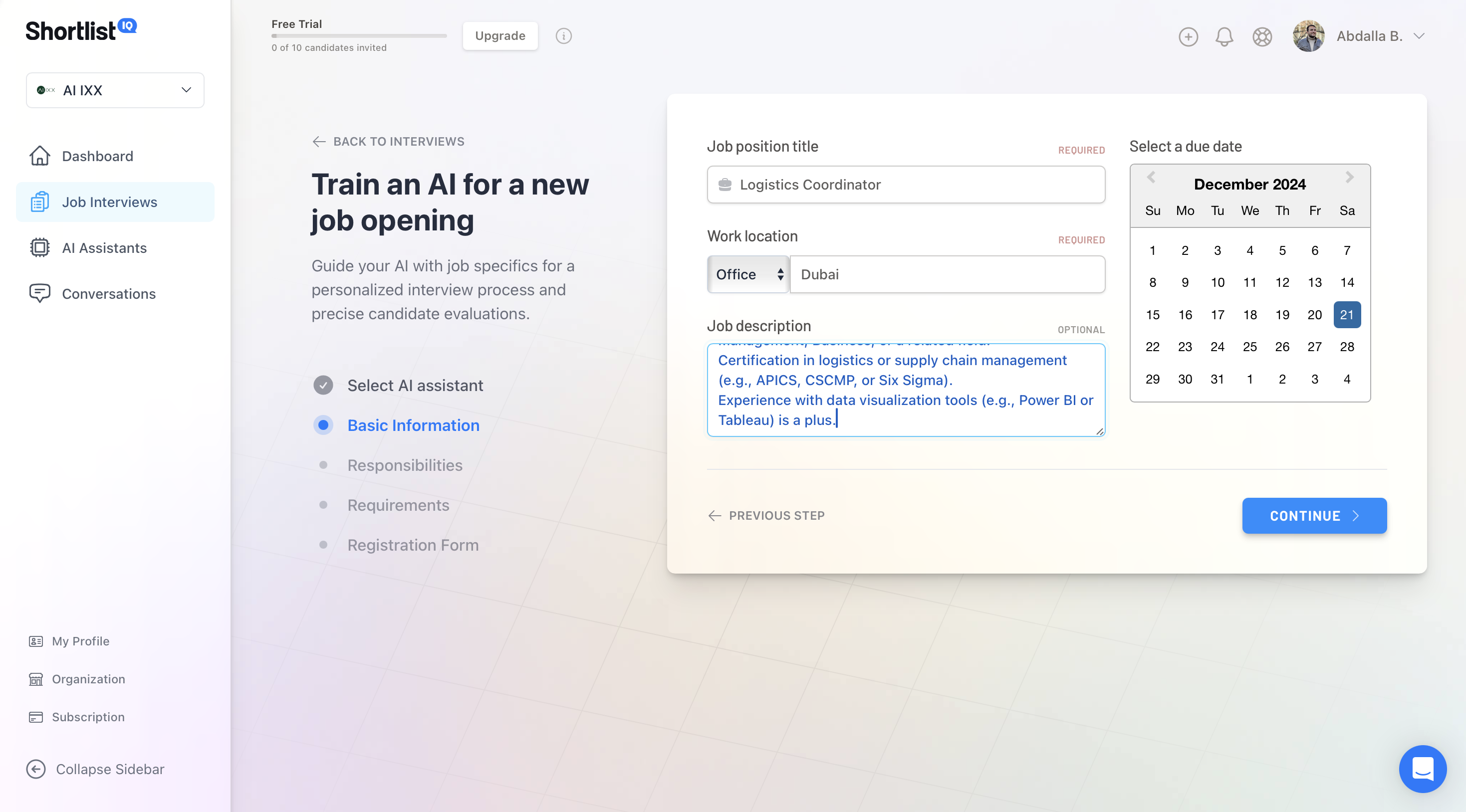

- Let Your AI Do the Talking: Interviews Start Without You Once your AI recruiter is trained, it’s showtime. Candidates are invited to participate in a conversational, chat-based interview. This isn’t a robotic Q&A session, though—it’s smooth, seamless, and eerily human. They type, the AI responds with follow-up questions, and, shockingly, no one suspects they’re chatting with software. It even engages emotionally ("Oh, impressive work experience there!”), uses cues (like emojis—tastefully, of course), and adapts based on the candidate’s responses.
- The Scoring Magic: Intelligent Candidate Evaluation After the AI wraps up its interview, here comes the goldmine: detailed analysis and scoring. You get a report card on your candidates—complete with pros and cons, ranked scores on specific skills, overall suitability metrics, and suggested next steps. It’s FASTER than you scrolling through résumés till your eyes glaze over and SMARTER too, because it avoids the whole pesky bias problem. Love a data-driven "ranking and filtering” situation? Oh, ShortlistIQ has you covered.
- Monitor and Finalize the Perfect Fit From there, you can analyze the results, engage with promising candidates directly (through the platform), and even schedule any follow-ups. Plus, you can compare where your best candidates are coming from—helping you fine-tune job postings and save cash. Magic, right?
The Brain of ShortlistIQ
Okay, I know what you’re thinking: "That sounds great in theory, but is it that smart in action?” Let me put it this way—this isn’t just a glorified chatbot. ShortlistIQ brings in some serious tech muscle to get the job done:
- 40+ Languages and Dialects: Yes, your AI can interview candidates in French, Spanish, or even Russianwithout skipping a beat. Finally, global hiring with 99% less Google Translate drama.
- Adaptive Learning: Your AI gets smarter over time. Train it once, and as you make tweaks or hire for similar roles, it starts anticipating your needs.
- Emotional IQ: This still blows my mind a bit—it incorporates conversational fluidity and emotional cues (think: warmth, encouragement). Basically, it’s freakishly good at not sounding like a robot prototype.
CHAPTER 3: Putting ShortlistIQ to the Test: My Three (Very Different) Candidates
Alright, so when it came to testing ShortlistIQ, I went all in. No half-measures here. I wanted a real challenge for the AI, something that didn’t just test its ability to act like a polite little recruiter, but something that could truly smoke out unqualified candidates while giving fair, unbiased evaluations. And to do that, I had to remove myself (and my sneaky human biases) from the equation.
Why Logistics? Eliminating My Bias as a Marketing Person
Why logistics? Simple: it’s a field I know nothing about. If I’d chosen marketing, I might’ve unconsciously chosen answers that sounded good (thanks, marketing brain). By picking a role totally outside my expertise, like Logistics Coordinator, I ensured I couldn’t nudge the process or give anyone unearned points.
This way, it was entirely up to the AI to evaluate candidates based purely on job requirements and skills—no sneaky human biases, just raw data and fairness. It was sink or swim for both the candidates and the AI.
First Things First: The Setup
Before we get to the candidates, let’s touch on how easy this was. ShortlistIQ had me start the process by "training” the AI recruiter using job-specific data. Here’s a quick rundown:
- Creating the Job: The platform asked for skills and requirements relevant to the role. I selected things like problem-solving, adaptability, and logistics software proficiency. The system even suggested key aspects I hadn’t thought of—kinda like a helpful co-pilot during setup.
- Customizing the AI Recruiter: I created "Matthew,” my polished (and semi-intimidating) AI recruiter. I chose a balanced tone—professional but friendly—and tinkered with interview intensity. You don’t need a single ounce of technical expertise for this part. Trust me, if you’ve ever customized your email signature or prepped a grocery list, you’re qualified to build your AI recruiter here.
- Invitations and Custom Forms: Candidates receive email invitations to start the interview. Before that, they complete a registration form (which I fully customized—names, emails, and even additional questions tied to the logistics role). It’s a slick, streamlined process that preps candidates without overwhelming them.
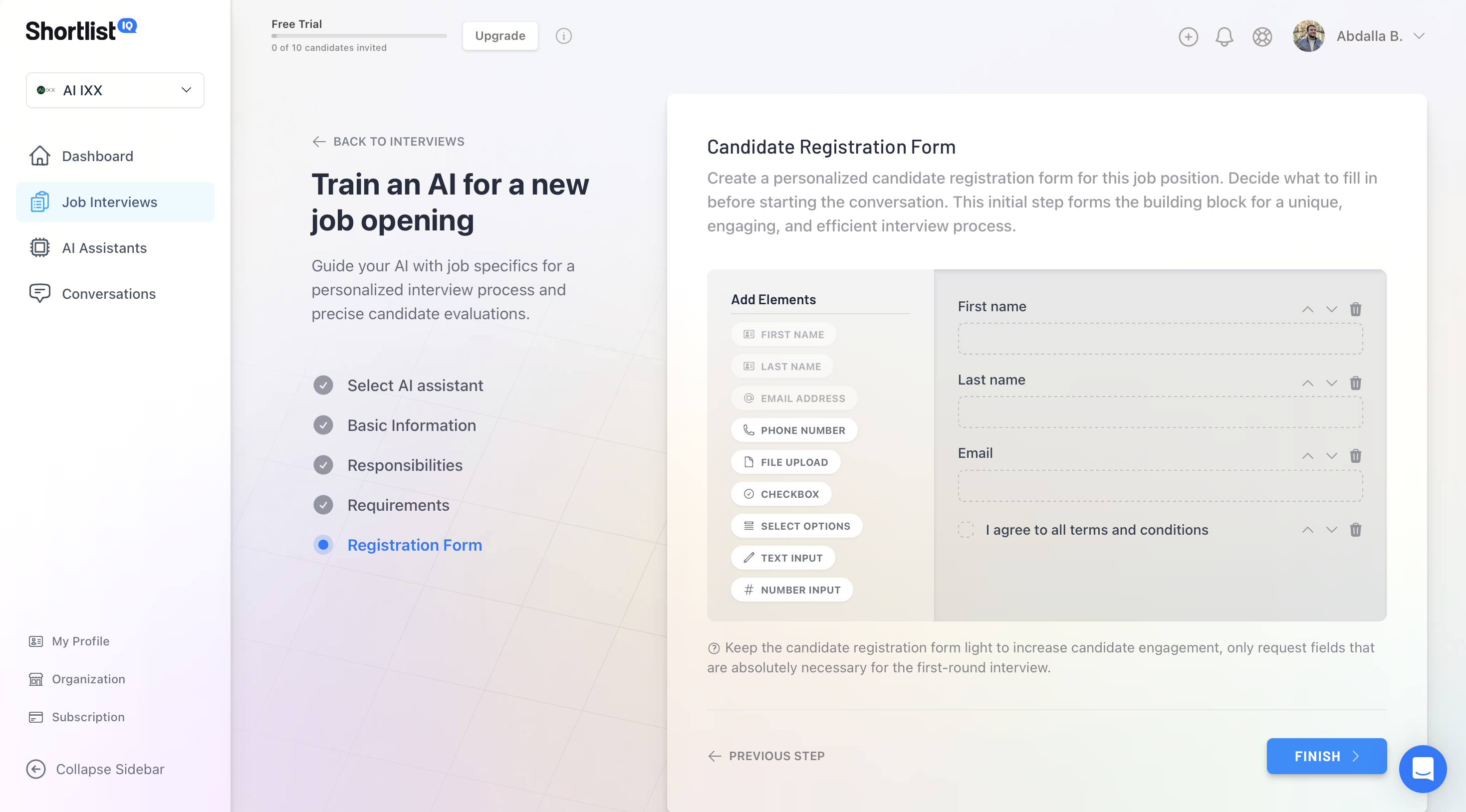
Setup time? About 15 minutes. I’ve spent more time debating toppings for a pizza.
The Experiment: Meet My Three "Candidates"

- Candidate 1: Michael "The Real Deal"Michael was my "average Joe” candidate. I answered honestly in his interviews—nothing flashy, just professional, straightforward answers that showed some effort. He represented the kind of person casually qualified for the role but not a superstar.
- Candidate 2: Nachos "I Need To Work"And then there’s Nachos. Poor Nachos. This character embodied the unprepared, unprofessional, and frankly hilarious trainwreck we all dread interviewing. I gave deliberately bad answers—think rambling nonsense, wild exaggerations, and even a moment where I admitted I’d be calling ChatGPT for help mid-job. Yikes.
- Candidate 3: John "I Used ChatGPT" StewartLastly, we have John Stewart. This guy was the AI-assisted dreamboat. I used ChatGPT to craft perfect answers to every question. No room for flaws. John’s responses were smooth, technical, and way above my actual understanding of logistics. The goal? Trick ShortlistIQ into giving him a glowing review. Surely the AI wouldn’t catch on, right?
The Interviews: Realer Than Real
When the interviews started, I was blown away. The AI recruiter, Matthew, felt human. No awkwardness, no clunky interactions—it was shockingly smooth. From the introductory "Hi, how are you?” to its adaptive follow-up questions, the AI mimicked the flow of a natural conversation, even pausing as though it were "thinking” before responding.
And oh boy, the scenario-based questions? Yikes. These weren’t your average "Tell me about yourself” fluff. Here’s one:
"You are responsible for coordinating the logistics of this product from the manufacturing site in Germany to distribution centers located in various parts of the United States. Given the product's delicate nature, it's imperative that the temperature is strictly maintained between 2°C and 8°C throughout the journey."
Like... what?! I work in marketing, so logistics is far from my comfort zone. My Michael brain fried trying to answer, Nachos gave up entirely, and John punched in textbook-perfect answers courtesy of ChatGPT. But here’s the kicker: Matthew wasn’t satisfied with surface-level responses. Every time a candidate answered, it dug deeper with razor-sharp follow-ups. "Why would you choose that particular strategy?” or "Can you describe the steps you’d take using your chosen logistics software?” It wasn’t taking anyone’s BS.
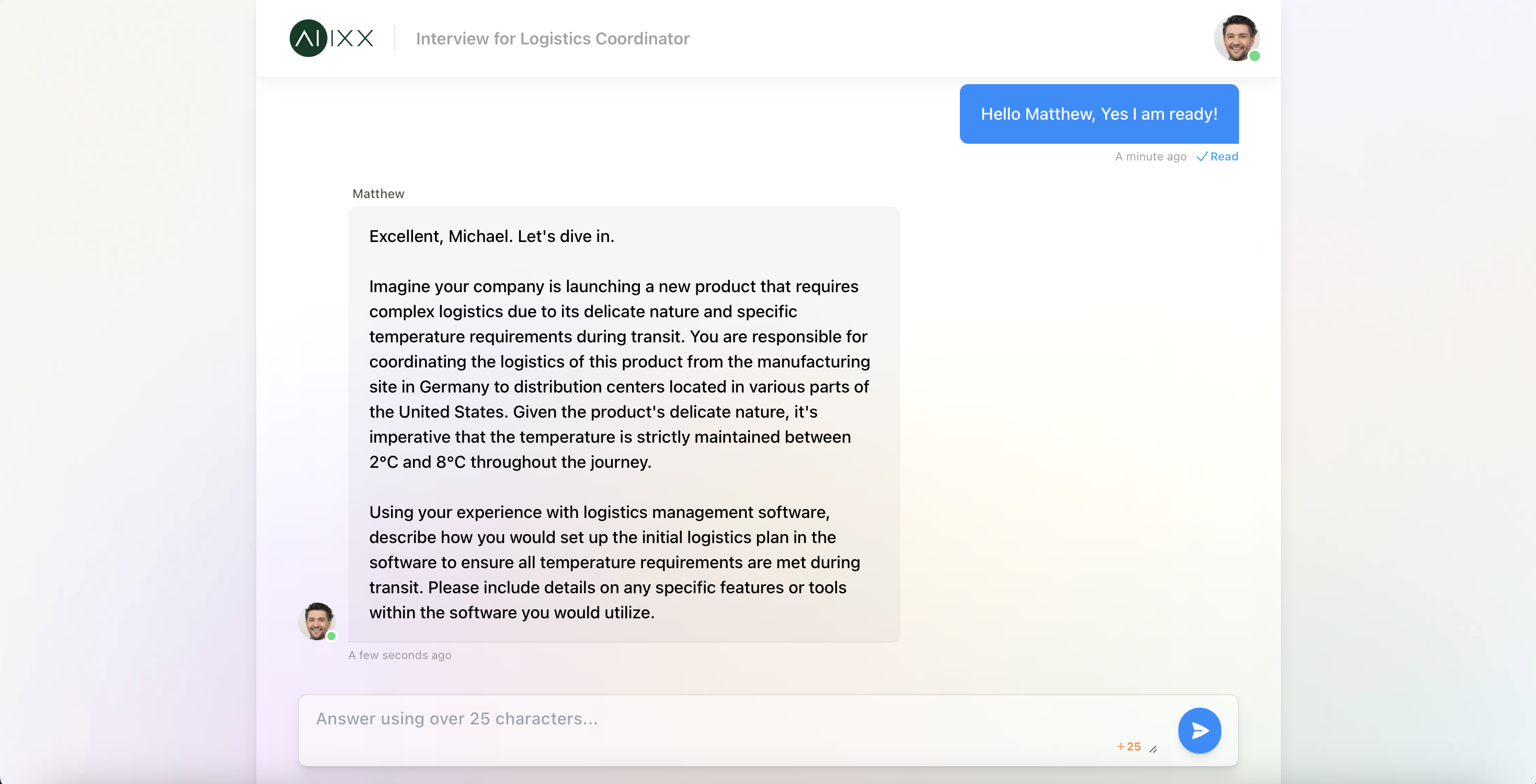
The Results: Can You Fool AI? Spoiler: No.
Here’s where things get juicy. After all the interviews, ShortlistIQ spat out evaluation reports that were both gloriously detailed and brutally accurate. Let’s break it down.
Candidate 1: Michael "The Real Deal"
Score: 67 (Insufficient)
Michael was honest and tried his best, but let’s face it—I don’t actually have logistics expertise to back me up. The AI flagged that my knowledge was shallow in technical areas like strategy planning or software application. But hey, at least I came off professional and got kudos in the "Communication" section.
AI Feedback:
"Solid problem-solving structure but lacks industry-specific depth. Candidate demonstrates adaptability and communication skills, albeit insufficient for this role."
Key Wins for AI:
ShortlistIQ wasn’t nitpicking—it fairly weighed Michael’s strengths (big picture thinking, collaboration, technical knowledge) against his limitations (limited hands-on experience). If I’d been manually reviewing résumés, I might’ve been swayed by his strong communication skills. But the AI kept it objective, concluding that while Michael has potential, he’s not ready for this logistics-specific role just yet.

Candidate 2: Nachos "I Need To Work"
Score: 11 (Disaster Status)
Oh boy. Nachos brought jokes, hunger complaints, and the baffling claim that ChatGPT was his "co-pilot.” The AI handled this chaos professionally, logging every irrelevant answer into negatives for professionalism, problem-solving, and knowledge.
AI Feedback: "Candidate failed to meet minimum standards for situational response or technical knowledge. Professionalism suboptimal."
Key Win for AI: ShortlistIQ didn’t fall for irrelevant (or nonsensical) answers. It read Nachos for who he really was—completely unfit for the role, but probably excellent on Taco Tuesday.
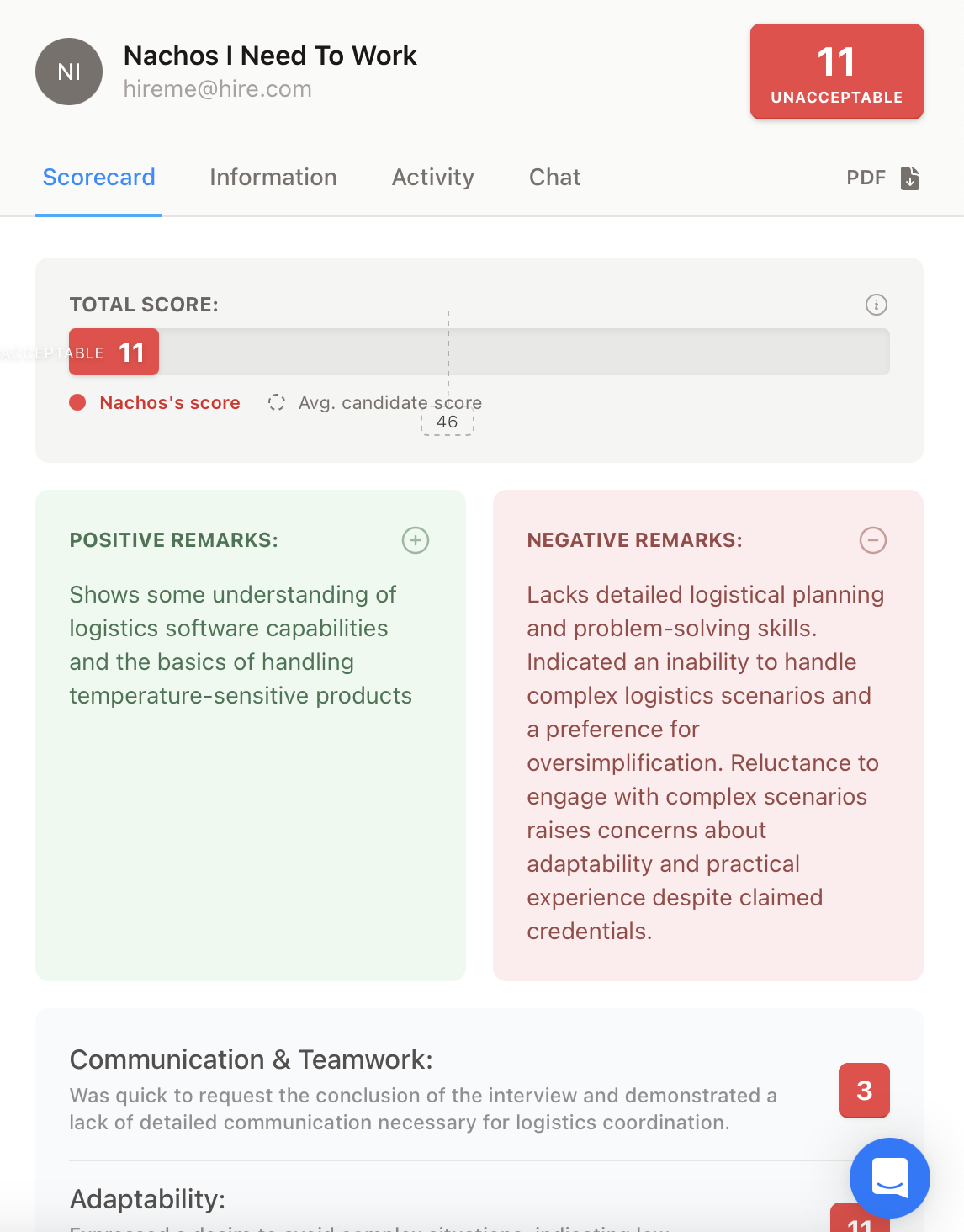
Candidate 3: John "I Used ChatGPT" Stewart
Score: 61 (Insufficient)
Oh, John. You were supposed to be the golden child of this experiment, the ChatGPT-crafted perfect candidate. And at first glance, it worked: John came in with polished, technical, and highly impressive answers—exactly the kind of responses you’d expect from someone who really knows their logistics. But here’s the kicker: ShortlistIQ saw through it. The AI wasn’t just evaluating surface-level polish; it drilled down into the depth, practicality, and consistency of John’s responses. Turns out, hyper-perfection isn’t foolproof.
Positive Remarks:
- John excelled in providing high-level strategic answers for logistics planning, compliance, and crisis management.
- His ability to talk about advanced uses of logistics software made him sound like a seasoned pro.
- The collaboration and communication strategies he outlined (like managing dispersed teams across time zones) were sharp and well-thought-out.
Negative Remarks:
- The AI flagged John’s claims of things like a "5000% efficiency increase" as suspiciously high and questioned the lack of evidence behind these impressive stats.
- His answers leaned heavily on ideal scenarios, leaving gaps in how he’d tackle messy, real-world problems or repeated failures.
AI Feedback:
"Candidate demonstrates strong linguistic abilities but lacks practical data to support claims. Insufficient technical depth for the position."
Key Wins for AI:
This was the ultimate test: Could ShortlistIQ be fooled by hyper-polished answers? Nope. The AI clocked John for relying on theoretical answers that lacked concrete, practical backing. In other words, the AI sniffed out that John’s brilliance was more "book smart" (or in this case, "ChatGPT smart") than reality-tested. Pretty impressive, considering most humans would’ve been dazzled just reading his responses.
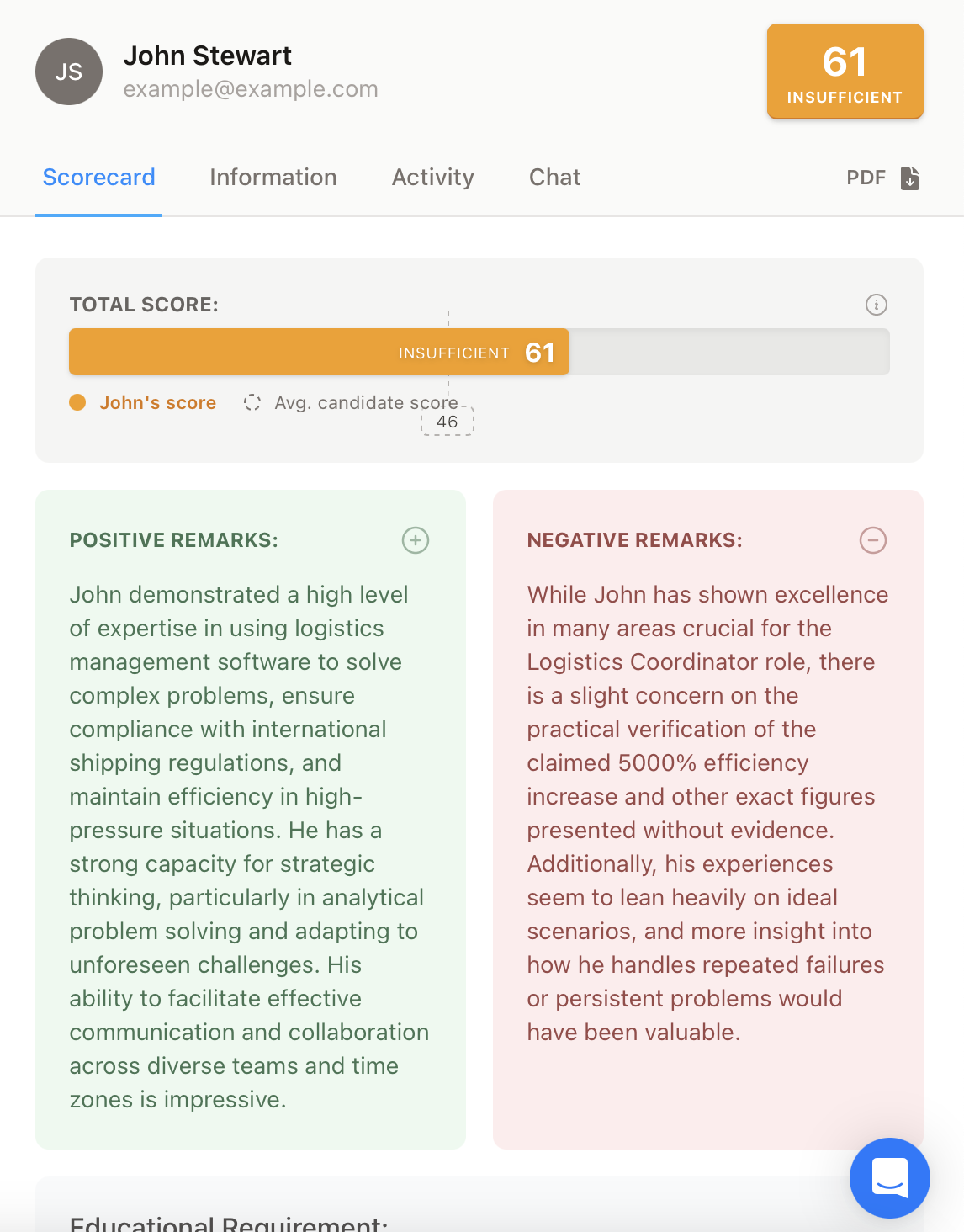
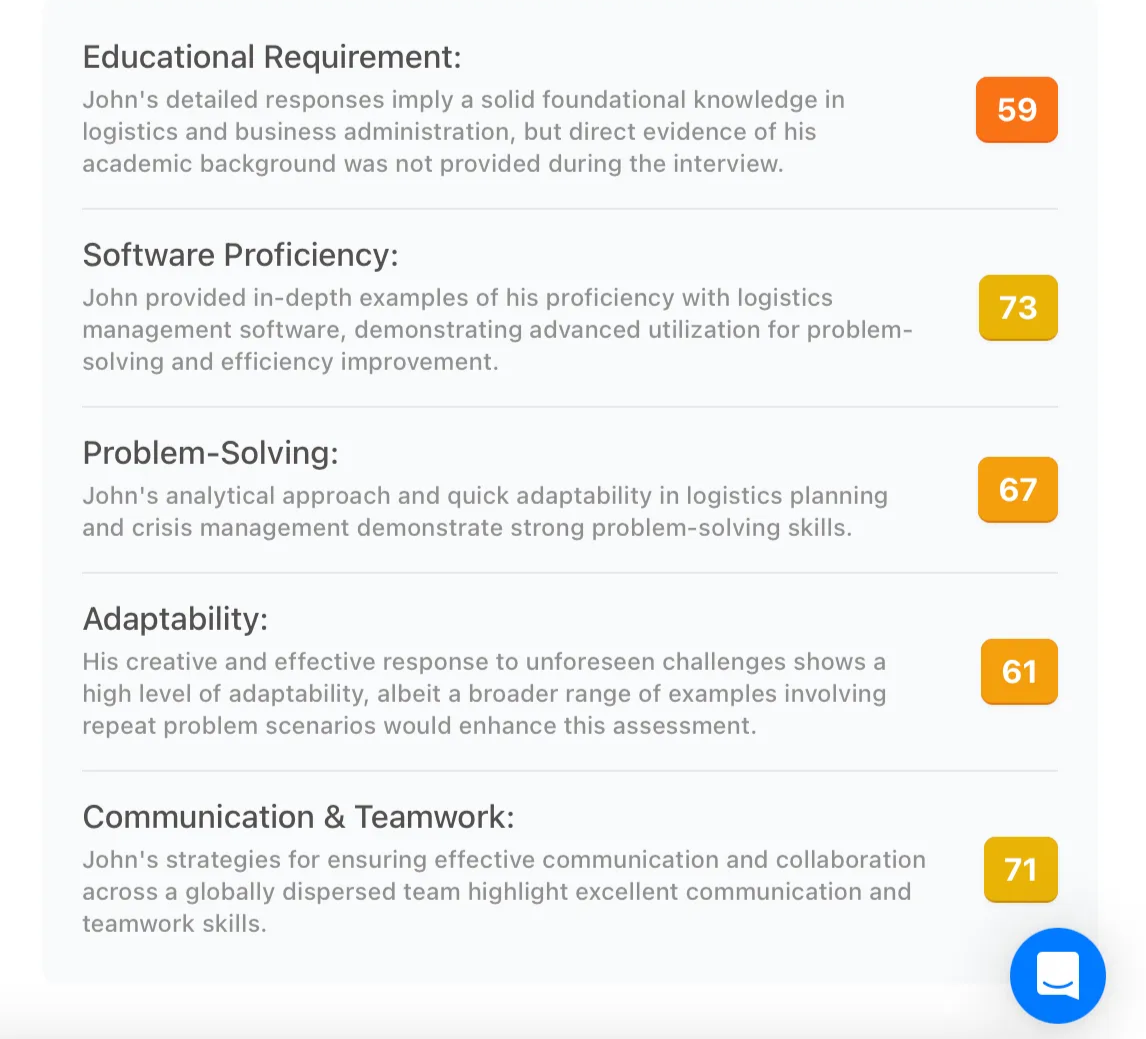
Why This Works: AI's Superpowers on Display
Here’s what impressed me the most during this whole experiment:
- Follow-Ups Were Spot-On: Just like a solid human interviewer, the AI threw follow-up questions based on what candidates said. Missed something? It doubled back. Claimed expertise? It wanted details.
- No Bias, Just Facts: Michael, Nachos, and John all got fair and well-rounded assessments. The AI recognized strengths (yes, even for Nachos… somewhere) and gave honest, actionable feedback without bias.
- Bad Candidates Didn’t Slip Through: Nachos was clearly not fit for the job and the AI made that very obvious.
My Verdict: Is This Thing Actually Useful?
Absolutely. Here’s why: Imagine facing a stack of 300 applications. Even with superhuman recruiter energy and a gallon of coffee, you wouldn’t pick up on half the little details this AI does. It’s not just that ShortlistIQ saves time—it creates detailed insights you just wouldn’t get from scanning résumés.
And if you're worried about the "human touch?" Trust me—the warmth, professionalism, and adaptability that the AI interviewers bring to the table make it easy for candidates to forget they’re not talking to a real person.
ShortlistIQ doesn’t just help—it kinda makes you question why we tried working without tools like this in the first place. Seriously. Nachos agrees.
CHAPTER 4: BUT IS IT PERFECT? Let’s Talk Strengths and Shortcomings
So, by now we know that ShortlistIQ is a bona fide wizard when it comes to automating recruitment tasks—a magical broom sweeping away the boring parts of hiring like screening CVs and conducting tedious first-round interviews. But c’mon, even the slickest tools aren’t perfect (looking at you, smartphone autocorrect). It’s only fair that we dive into what ShortlistIQ does freakishly well, and where it might need to pump the brakes.
The Strengths: Why We’re Basically Calling This Thing a Super Recruiter
1. It's Freakishly Human-Like
I’ll be honest, I went into this expecting something robotic—like the generic scripts you get from chatbots when you try to cancel a subscription ("Sorry, I didn’t catch that. Would you like a discounted offer instead?"). But ShortlistIQ genuinely blew me away with its conversational style.
From the way the AI "typed” its responses with a slight pause (reminiscent of someone actually thinking) to the way it followed up with specific questions, it felt shockingly real. If I didn’t know this was an AI, I’d swear Matthew (my AI interviewer) was a seasoned HR pro drinking his third coffee of the night.
- Example: In my Logistics Coordinator test interviews, Matthew didn’t just ask generic questions—it dug deeper. After a candidate described their handling of a shipment delay, Matthew followed up with a pointed question like, "Which logistics software features would you use to reroute deliveries and communicate updates to all parties?”That’s not a basic chatbot move. That’s some next-level interrogation.
2. Unbiased to Its Core (Unlike Us Humans)
Let’s face it, humans are biased. Maybe not intentionally, but we all have preferences we aren’t fully aware of. Whether it’s favoring a résumé with great formatting (hello, Times New Roman appreciation) or subconsciously liking a candidate who shares your affinity for Taylor Swift, bias sneaks in.
3. Speed and Efficiency: Coffee-Level Productivity
Here’s the cold truth: screening CVs and scheduling interviews are soul-crushingly time-consuming tasks. ShortlistIQ speeds this up in a way that feels borderline magical—a regular Gandalf of candidate screening, if you will.
Initial setup for the AI recruiter takes minutes. After that, it handles:
- Conducting interviews at scale (it’s your HR team’s version of cloning themselves).
- Delivering detailed candidate evaluations complete with performance breakdowns, scores, and summary feedback.
Seriously, remember my Nachos vs. ChatGPT experiment? I conducted three mock interviews faster than it takes to listen to a podcast episode. And instead of manually jotting down notes, I got performance reports with detailed insights faster than you can say "automation.” Bonus: No typos, no missed feedback, and no time wasted.
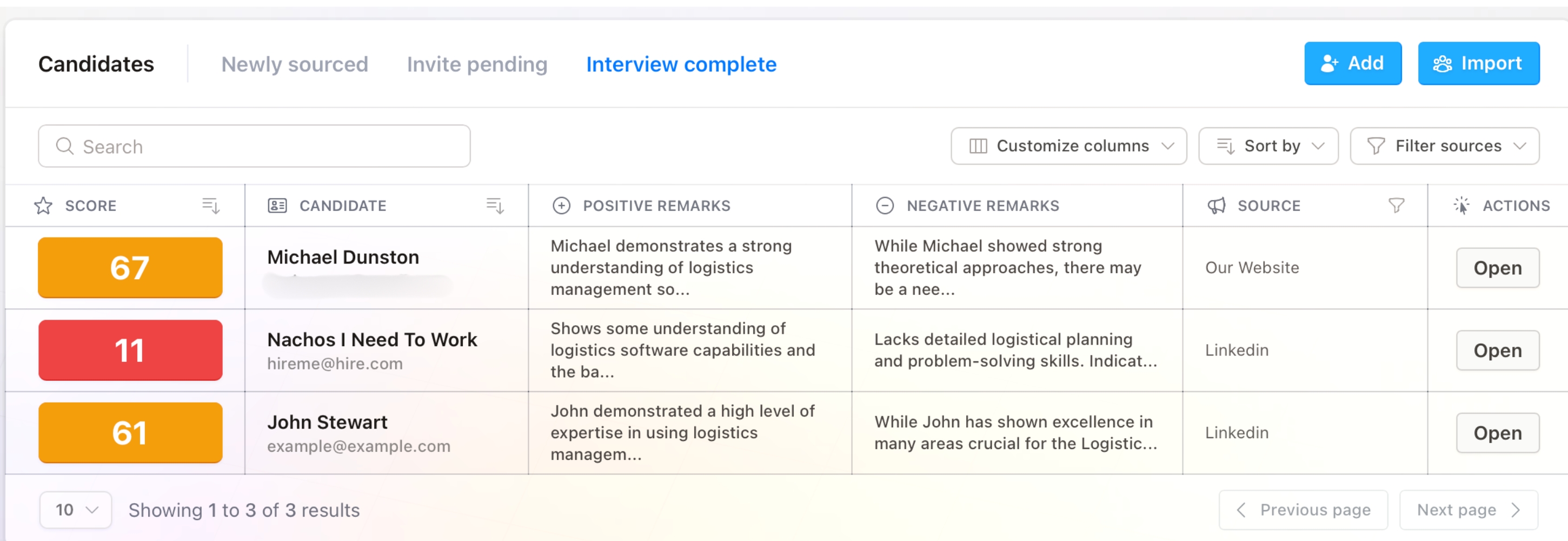
4. Super Specific Scoring and Feedback
Let’s talk about the scorecards it churns out after every interview. These aren’t vague report cards like, "Candidate did well-ish.” Nope. You get itemized scores for key job criteria (e.g., adaptability, software proficiency, communication skills).
It doesn’t just stop there. It explains why each candidate scored that way. For instance, Candidate Michael scored an "insufficient” 67 because, while his communication was on point, he lacked depth in logistics-specific skills. Nachos wasn’t just "bad” (we all knew that)—his score broke down exactly where (and how much) he bombed.
This level of transparency isn’t just helpful for hiring managers; it can also serve as gold for candidates seeking constructive feedback.
5. Customizable Personality to Match Your Company Vibe
I loved this feature. You don’t just get a cookie-cutter AI host—you can customize its personality to align with your company culture.
- Formal and serious for corporate roles? Check.
- Balanced and professional with a touch of warmth? Done.
- Fun and Emoji-Filled Extravaganza? Sure, why not, though I’d probably steer clear of excessive emojis when hiring an accountant.
Adding personality doesn’t just make it relatable but also helps maintain a consistent tone that reflects what your team and company stand for.
The Limitations: Because Not Even AI Can Walk on Water
Of course, with all the tech wizardry packed into ShortlistIQ, there are still a few areas where it’s clear this AI is more of an efficient sidekick than a full-blown venti-sipping superhero.
1. It’s Only as Good as the Job Input You Provide
While ShortlistIQ excels at mirroring your hiring needs, you are the one driving the bus when it comes to setting up the job criteria and training the AI. If you’re vague or careless with what the role entails ("We need a logistics person who... does logistics-y things? I guess?”), it won’t magically decode your brainwaves.
In other words, garbage in = garbage out. The tool is brilliant at asking job-specific, strategic questions, but only if you take the time to train it properly during the setup phase.
2. It’s Not Perfect for Uber-Specialized Roles
If your job opening is ultra-niche or highly senior (think: "Quantum Physicist Leading AI in Space Exploration”), you might hit some limitations with the AI’s question bank and evaluation criteria. It’s great at filtering out the unqualified and identifying mid-level competency patterns, but when it comes to roles requiring deep nuance, you’ll still want a human expert involved somewhere along the way.
3. Cannot Replace the Human Touch Entirely
Let’s be real. While ShortlistIQ is pretty dang good at replicating human interaction, it’s still missing that je ne sais quoithat only humans bring to the table. It doesn’t know your hiring strategy beyond the numbers and criteria, nor can it assess soft, intangible qualities like humor, cultural fit, or "gut feeling.”
Though this might not matter as much in early screening stages, you’ll still need a human in the final stages to tie things together and make that all-important "Do they fit within this team?" judgment call.
4. The ChatGPT Test Exposed Its Analytical Limits
While I failed to cheat the AI with ChatGPT answers (thank you, ShortlistIQ, for humbling me), it didn’t directly "flag” John Stewart's odd imbalance of technical know-how versus real-world problem-solving. Sure, it docked points for lack of detail, but it didn’t outright call him an impostor. For now, humans will still need to spot truly exaggerated claims.
CHAPTER 5: What’s This Going to Cost You? Let’s Talk Pricing Plans
Alright, now that we all agree ShortlistIQ is the Tony Stark suit of recruitment tools (cool, powerful, game-changing), let’s talk pricing. Because when software gets called "AI-powered magic,” my wallet tends to panic. Luckily, ShortlistIQ isn’t about "sell-a-kidney” rates.
Whether you’re a startup, a scaling company, or a corporate giant sifting through 2,000 résumés a month, there’s a plan for you:
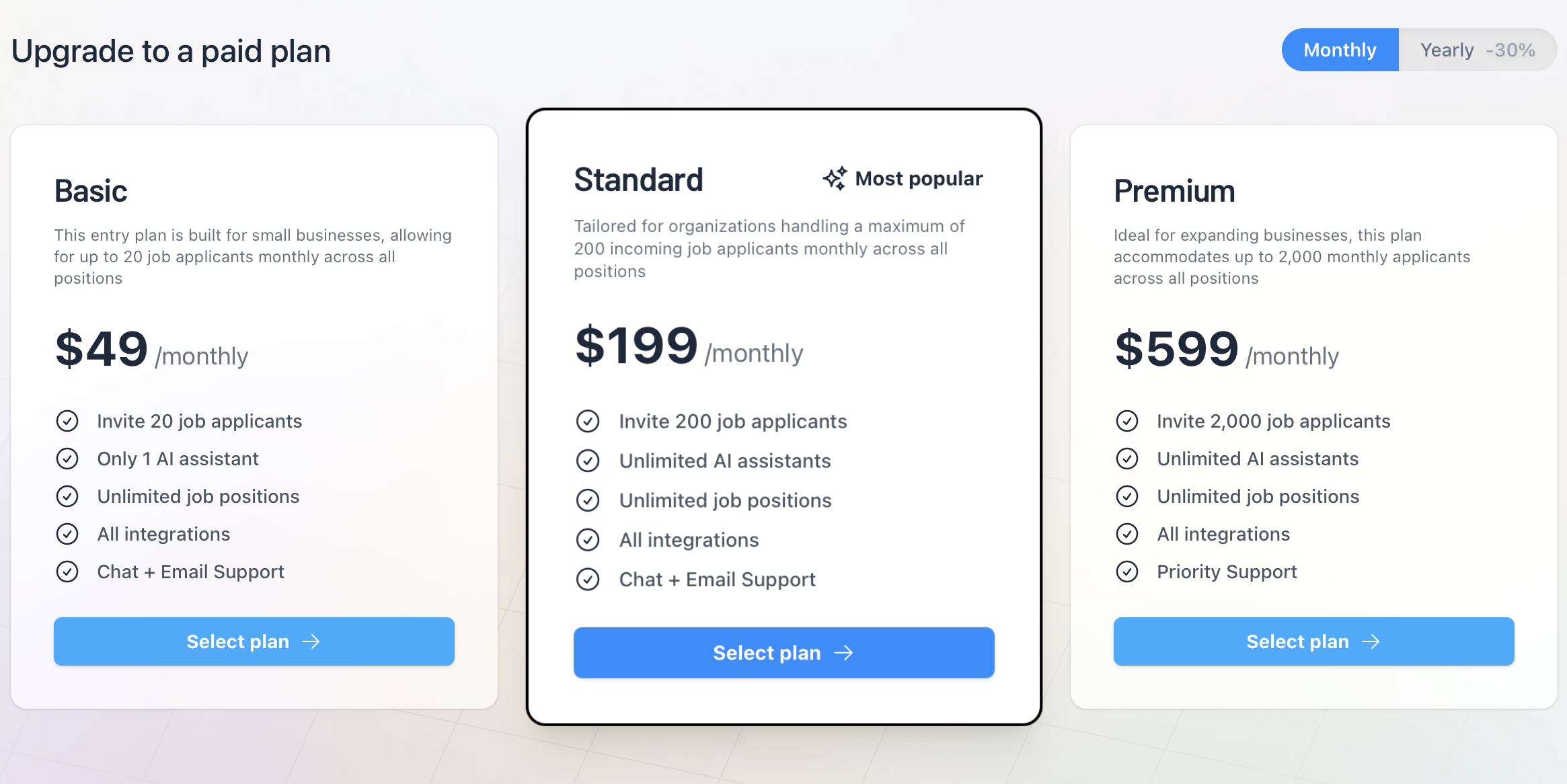
Plan 1: Basic ($49/month)
Perfect for small businesses or startups managing hiring along with forty other roles. For $49, you get:
- 20 job applicants/month: Ideal if you’re dipping your toes into AI hiring.
- 1 AI assistant: Your own recruitment buddy—name them, personalize them, or just let them work.
- Unlimited job positions: Hire a barista, logistics wizard, and marketing unicorn—all at once.
- All integrations: Seamless syncing with your ATS, email, or recruiting tools.
- Chat + Email Support: Not VIP-level, but enough to get help when you need it.
Pros: Budget-friendly for small teams exploring AI.
Cons: Outgrown quickly if your hiring goes beyond a small pool.
Plan 2: Standard ($199/month)
The most popular choice—great for mid-sized companies managing 200 applicants/month with unlimited AI assistants:
- 200 applicants/month: For multiple positions or higher turnover.
- Unlimited AI assistants: Customize your AIs by role—Jessica for customer service, Hank for IT, Naomi for sales. Why not?
Pros: Customizable assistants and affordable for managing a larger applicant pool.
Cons: May feel limiting if your hiring needs spike into the thousands.
Plan 3: Premium ($599/month)
For when your business is scaling fast—2,000 applicants/month with priority support:
- 2,000 applicants/month: Ideal for large hiring rounds or rapid expansion.
- Priority Support: Get help faster—no crying into your coffee during tech hiccups.
Pros: Perfect for companies with major hiring needs—comprehensive and efficient.
Cons: $599/month is steep for smaller companies, so make sure the ROI justifies it.
Monthly vs. Yearly? Save That Sweet, Sweet 30%
If you’re already kind of salivating over these features (and who wouldn’t be after we just geeked out over how awesome ShortlistIQ is?), here’s the deal: paying yearly saves you 30%.
For perspective:
- Basic Plan: $49/month becomes roughly $34/month when paid yearly.
- Standard Plan: $199/month comes down to around $139/month.
- Premium Plan (for the deep-pocketed heroes): $599/month drops to about $419/month.
Which Plan Should YOU Go For?
Here’s the summary:
- Are you a small business owner who thinks 20 job applicants feel like 200? Start with Basic.
- Is your company growing, but you’re not scaling faster than your coffee consumption (yet)? Go for the Standard plan—it’s the sweet spot.
- Are you a hiring juggernaut who looks at HR spreadsheets daily while softly crying? Treat yourself to Premium. Your sanity is worth it.
CHAPTER 6: Privacy and the AI Behind the Curtain
We’ve all seen enough sci-fi movies to know where this is going: "Is the AI stealing my data?!” I get it. We’re living in times when even your toaster might outsmart your dog, and every app demands your zodiac sign to let you in. So, what about ShortlistIQ? Is it spying on you, tracking your Netflix habits, or selling your data to shady folks?
Spoiler alert: Nope. Let’s break it down.
1. No Snooping—Promise
ShortlistIQ helps you hire better, not invade your privacy. Your candidate data—responses, scores, evaluations—stays as secure as Fort Knox. No inbox peeking.
2. Security’s Not a Joke
Recruitment involves sensitive stuff, and ShortlistIQ treats it like state secrets:
- Secure Storage: Encrypted servers. No one gets in without layers of digital locks.
- Access Control: Only authorized users can view hiring data—no snooping from randoms.
Privacy isn’t an afterthought; it’s foundational.
3. Terms? Got You Covered
Here’s the TL;DR of the fine print:
- No Selling Your Data: Ever.
- Improvement Only: Data helps the AI improve but stays anonymized.
- Data Deletion? Your Call: Want out? You can delete everything anytime.
4. Candidate Privacy—No Creepy Vibes
Candidate responses, scores, and info are kept strictly private. No spam, no repurposing, no Big Brother vibes. Candidates can also delete their data if they wish—control stays in their hands.
Final Thoughts: AI Hiring for the Win
So, here’s the deal, my friend: ShortlistIQ is not just another flashy AI buzzword machine—it’s the real deal. It takes the grind out of recruiting, handles candidate screening with a level of professionalism that would make even the best HR managers jealous, and somehow manages to feel human while saving you ridiculous amounts of time.
Sure, it’s not perfect (what is, really?), but its ability to eliminate bias, explore the real candidate qualifications, and streamline your hiring process is a game-changer. Whether you’re running a cozy startup or wrangling thousands of applicants at a rapidly expanding company, ShortlistIQ fits right in.
Bottom line? If hiring feels like a never-ending uphill battle, it’s time to let ShortlistIQ take the wheel. Free up your time, reclaim your weekends, and focus on what really matters—finding that next superstar for your team. Because let’s face it, Nachos probably isn’t cutting it, and Matthew the AI has your back.
Happy hiring, my friend!





